八年级下英语unit1教学设计
- 格式:doc
- 大小:40.00 KB
- 文档页数:7
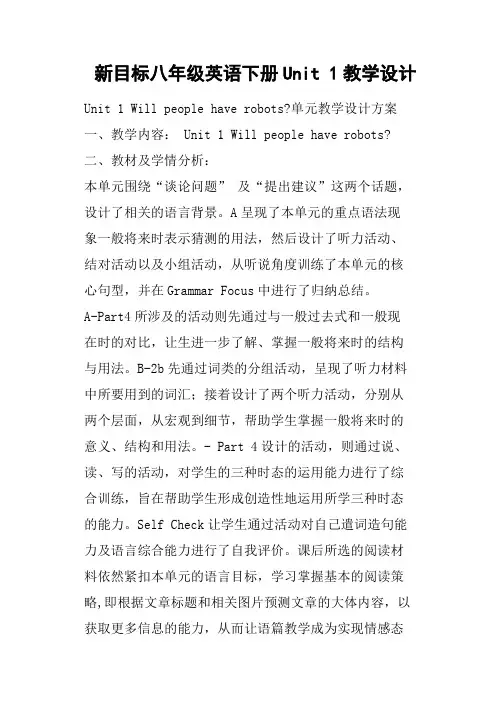
新目标八年级英语下册Unit 1教学设计Unit 1 Will people have robots?单元教学设计方案一、教学内容: Unit 1 Will people have robots?二、教材及学情分析:本单元围绕“谈论问题” 及“提出建议”这两个话题,设计了相关的语言背景。
A呈现了本单元的重点语法现象一般将来时表示猜测的用法,然后设计了听力活动、结对活动以及小组活动,从听说角度训练了本单元的核心句型,并在Grammar Focus中进行了归纳总结。
A-Part4所涉及的活动则先通过与一般过去式和一般现在时的对比,让生进一步了解、掌握一般将来时的结构与用法。
B-2b先通过词类的分组活动,呈现了听力材料中所要用到的词汇;接着设计了两个听力活动,分别从两个层面,从宏观到细节,帮助学生掌握一般将来时的意义、结构和用法。
- Part 4设计的活动,则通过说、读、写的活动,对学生的三种时态的运用能力进行了综合训练,旨在帮助学生形成创造性地运用所学三种时态的能力。
Self Check让学生通过活动对自己遣词造句能力及语言综合能力进行了自我评价。
课后所选的阅读材料依然紧扣本单元的语言目标,学习掌握基本的阅读策略,即根据文章标题和相关图片预测文章的大体内容,以获取更多信息的能力,从而让语篇教学成为实现情感态度与价值观目标的有效载体,通过描述未来,调动学生学习积极性,发挥想象力,帮助其树立正确的人生观和价值观:只有付出,才有收获。
八年级上Unit 3 What are you doing for vacation? Unit 10 I’m going to be a basketball player. 已经学习了一般将来时,学生已经学会用现在进行时谈论未来的计划,用be going to句型谈论未来的打算。
本单元教材继续学习一般将来时,是上册教材的拓展和延续,即用Will 接动词原形来表示将来要发生的动作,让学生学会预测未来,从语法层面上来讲应该顺理成章。
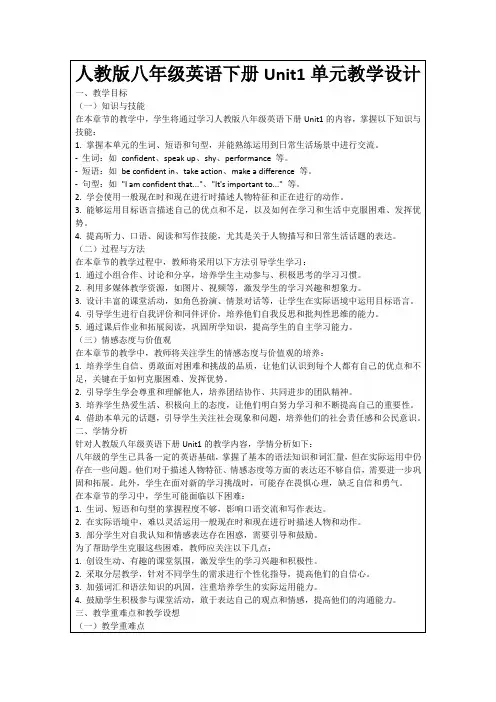
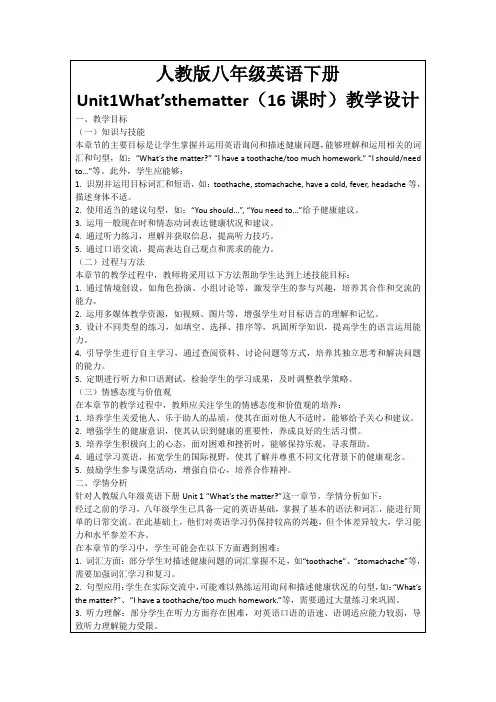
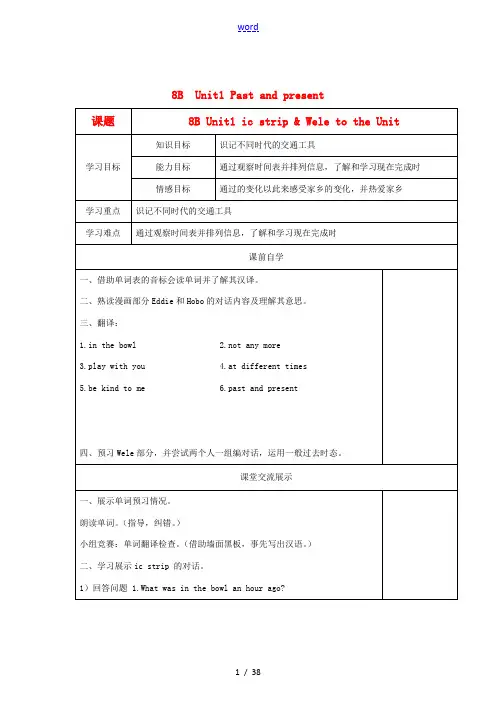
8B Unit1 Past and present8B Units1导学案参考答案Unit1第一课时:一、1.was 2.has eaten 3.to have 4.to play 5.is eating 6.took 7.rode8.will be二、1.would like , grows up 2.walks to school 3.goes to work by bus 4.flies to5.don’t want to any more第二课时:一、1.know about 2.get married 3.move out 4.water pollution 5.in the centreof6.feel lonely7.turn into8.from time to timeed to do 10.in some ways二、well has lived southern got married in the centre of children has changed a lotmarket stallsHas turned into to play cards pleasant shoe factory waste waterfish and plants polluted took action cleaner in some ways open space lonely第三课时:一、1. I don’t want to play with you any more.2.There used to be the home of birds.3.He live in Beijing since he moved here.4.In the past ,many people had no money to go to school.5.Nanjing has changed a lot in the past five years.6.Many friends have moved to other places ,so I feel lonely from time to time.7.I had an interview with my Chinese teacher this morning.8.It has bee more difficult to play chess with my old friends.二、1.Where have they gone ..2.How long has lived3.When was born4.you helping me第四课时:一、1.dishonest 2.unhappy 3.unlucky 4.impolite 5.unkind二、D C C B C A三、1.cheaper 2.healthiest 3.impossible 4.safely 5.well better第五课时:一、1.They haven’t read the book yet.Have they read the book yet? Yes, they have/ No , they haven’t1.How long has Daniel stayed in Shanghai?2. I have known him for ten years.3.Sandy has been in Beijing for half an hour.二、1. Have seen have did see2.lent hasn’t given 3.have been did visit第六课时:一、C C A A D B二、1. He has already finished homework.2.Have you ever been to Beijing?3.I have known Linda for 3years.4. I have just seen Lily.5.We haven’t heard from him for a long time.第七课时:一、1.is 2.do 3.will be 4.shall go 5.taught 6.has taught 7.has gone8.Have seen 9.have learned 10.will arrive二、1.How long have you known him?2.Has Jane finished her homework?3.I haven’t worked in this school for two years.4.Why hasn’t Jim finishedhis homework?5.when did you buy this watch?6.Who is the old man next to Lily?7.Which girl is my sister?8.How far is your home from your school?第八课时:一、1.advantages 2.reduce 3.changed 4.developments 5.service6.interview7.realizes 9.repair二、1.recently 2.unpleasant 3.impolite 4.have done 5.left6.southern7.polluted8.Has arrived arrived9.has eaten 10.have been第九课时:第十课时:一、1.as often as before 2. have an interview with sb ed to do sth 4.so big and modern5.in the north of二、1. was has lived 2.was made 3.Has arrived arrived 4.has eaten5.safely6.has been7.have been三、1.B 2.C 3.B 4.C 5.D 6.A四、1.Have you anything 2.doesn’t provide any longer 3.since ago ed to5.has been to。
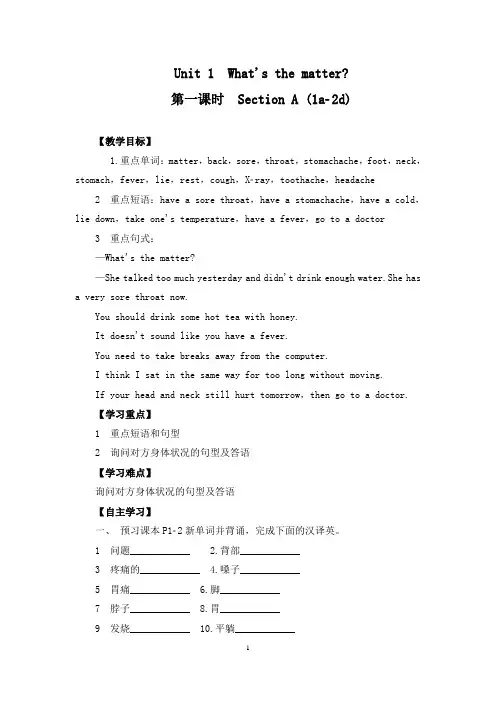
Unit 1 What's the matter?第一课时Section A (1a2d)【教学目标】1.重点单词:matter,back,sore,throat,stomachache,foot,neck,stomach,fever,lie,rest,cough,Xray,toothache,headache2 重点短语:have a sore throat,have a stomachache,have a cold,lie down,take one's temperature,have a fever,go to a doctor3 重点句式:—What's the matter?—She talked too much yesterday and didn't drink enough water.She has a very sore throat now.You should drink some hot tea with honey.It doesn't sound like you have a fever.You need to take breaks away from the computer.I think I sat in the same way for too long without moving.If your head and neck still hurt tomorrow,then go to a doctor.【学习重点】1 重点短语和句型2 询问对方身体状况的句型及答语【学习难点】询问对方身体状况的句型及答语【自主学习】一、预习课本P12新单词并背诵,完成下面的汉译英。
1 问题____________ 2.背部____________3 疼痛的____________ 4.嗓子____________5 胃痛____________ 6.脚____________7 脖子____________ 8.胃____________9 发烧____________ 10.平躺____________11 休息____________ 12.咳嗽____________13 X光____________ 14.牙疼____________15 头疼____________二、认真预习1a2d找出下列短语和句型。
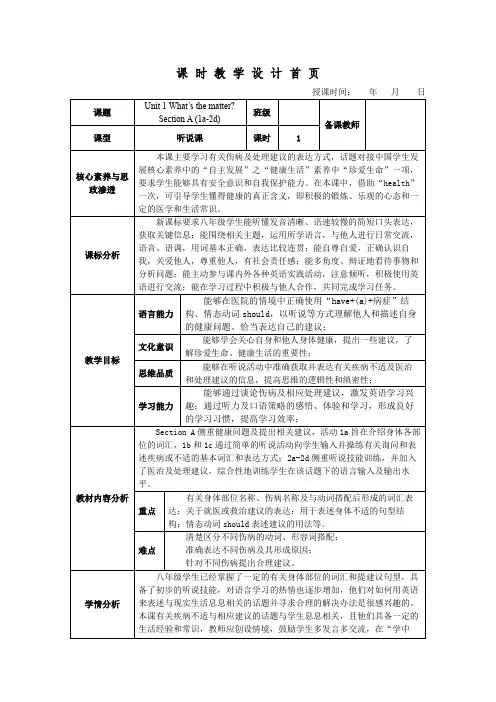
课时教学设计首页教学流程教师导学Play a video about Argentina winning the World Cup final.T: Do you know why they get a big success at FIFA World Cup Qatar 2022?T: Let’s watch a video to know more about our bodies!Guide Ss to know the words about body parts. Provide a game and some exercises.1. We look with our _____.2. We listen with our _____.3. We smell with our_____.4. We walk with our _____. T: There was something wrong with Peter. What’s the matter?learn different health problems Read the conversations afterPresent some pictures and elicit Ss to give more different problems in English.E.g. have a coldhave a sore throathave a headachecut myself by accidentT plays the recording for the first time and let Ss number the names.T plays the recording for the second time and let Ss match the reasons and the pictures.(A chart can be provided, including names, problems and reasons.)Provide some listening strategies.T: As a doctor, I need to give some advice to patients.Let Ss to look at 2a and the picture on Page 2 and ask some questions to help them make a prediction before listening.T can give Ss opportunities to show their answers with a whole sentence.Listen for the second time , some Ss show their answerswith a whole sentence.Make conversations with their partners.Step 5. Role-play.(2d) Read the conversation in roles between Mandy and Lisa.Some pairs to come to the front and act out their own conversations or role—play the conversation only.Practice several times. Divide the Ss into 3 groups, recite the conversation in 1 minute.Step 6. Conclusion. HEAlTH: Happy Excise Activity Love ThinkStep7. Exercises.T: In Picture 1, she has a cough and sore throat, what should she do?Show the 5 pictures on PPT, and give the phrases of treatment on the right, encourage Ss to give some other reasonable treatments .Play the recording for Ss to listen and repeat.Encourage Ss to read the conversation alone and find out the answers to the following questions:Q1: What’s the matter with Lisa? Q2: What did Lisa do on the weekend?Q3: What’s Mandy’sadvice?/What should Lisa do?Guide Ss to memorize some patterns in the conversation.e.g. Are you OK?What should I do?It doesn’t sound like...That’s probably why.can’t move my necktake breaks away from the computersit in the same way for too long without movingT: Health is so important. Please remember: an apple a day keeps the doctor away!Step8. Summary.Make a summary with the students.课时达标检测第页课时教学设计尾页第页。
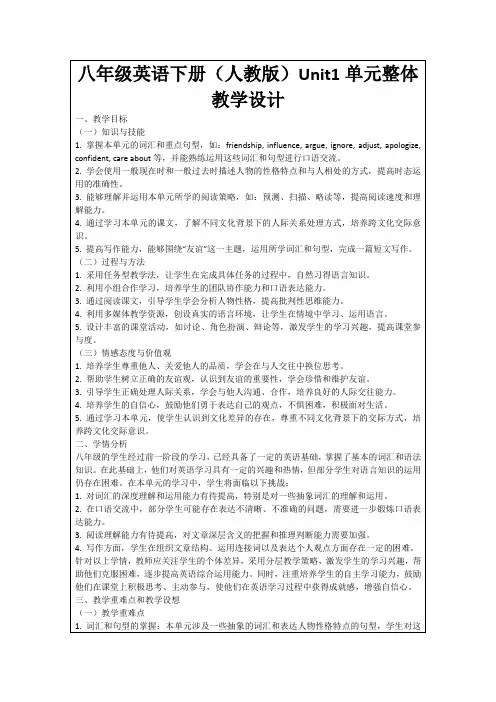
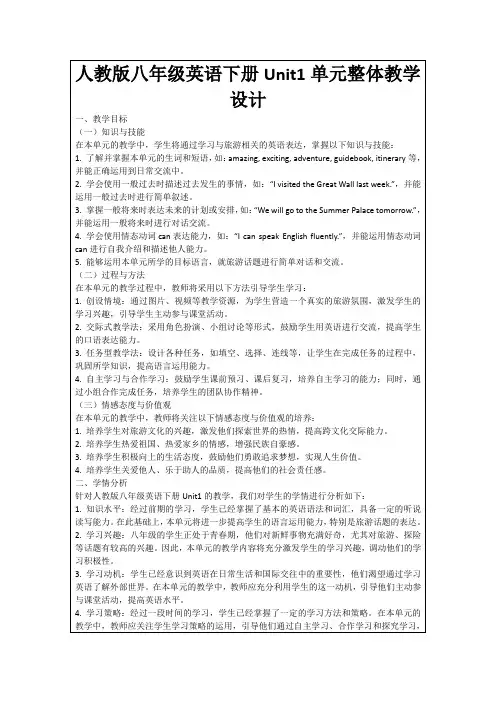
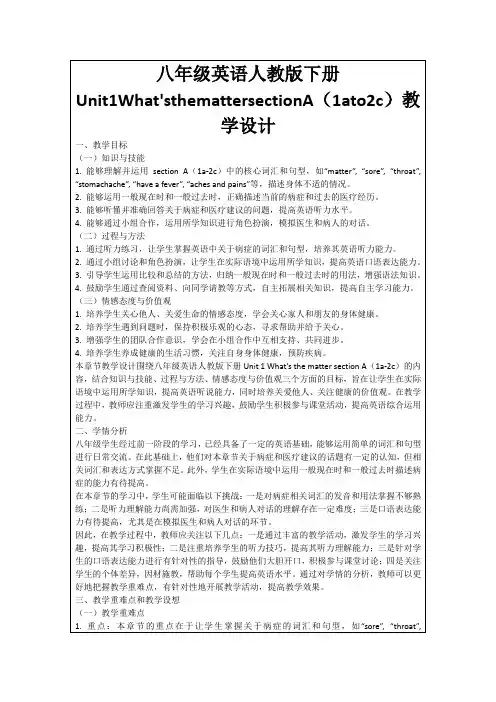
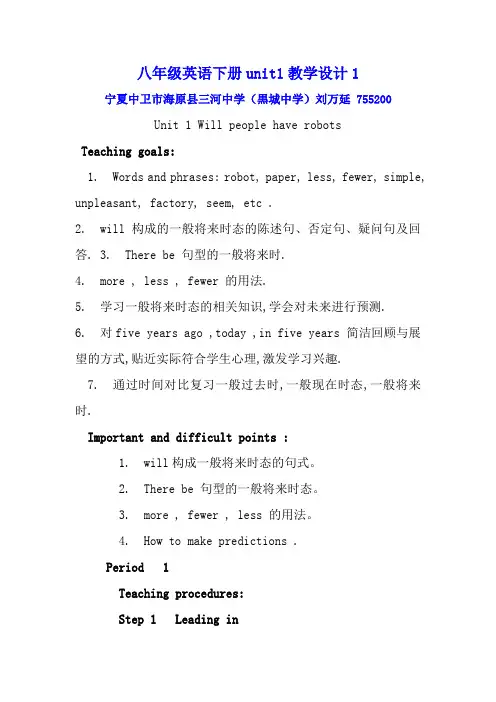
八年级英语下册unit1教学设计1宁夏中卫市海原县三河中学(黒城中学)刘万延 755200Unit 1 Will people have robotsTeaching goals:1. Words and phrases: robot, paper, less, fewer, simple, unpleasant, factory, seem, etc .2. will 构成的一般将来时态的陈述句、否定句、疑问句及回答.3. There be 句型的一般将来时.4. more , less , fewer 的用法.5. 学习一般将来时态的相关知识,学会对未来进行预测.6. 对five years ago ,today ,in five years 简洁回顾与展望的方式,贴近实际符合学生心理,激发学习兴趣.7. 通过时间对比复习一般过去时,一般现在时态,一般将来时. Important and difficult points :1. will构成一般将来时态的句式。
2. There be 句型的一般将来时态。
3. more , fewer , less 的用法。
4. How to make predictions .Period 1Teaching procedures:Step 1 Leading in1. Greetings: Welcome to school .What's the date today ? Who's on duty today ?Do you enjoy your winter holiday ?Do you finish your homework ?Do you want to live on the moon ?Can you guess what will happen in ten years ?Collect the Ss' answers and say something about their predictions .Step 2 Pre-taskSB Page 2 ,1a .1. Look at the picture :How will the world be different in the future ,100 years from now ?We're going to talk about sth in 100 years .2. Read each predictions to the class .Explain the new vocabulary .3. Read the instructions .Make sure Ss know what they should do .4. Do it by themselves .5. Talk about the answers with the class .Explain :一般将来时态构成: will / be going to +动词原形Step 3 While-taskSB Page 2 ,1b .1. Practise reading the six predictions .2. Read the instructions to Ss .Circle the things you hear on the recording .3. Play the tape twice .4. Play the tape a third time .At the same time ,checkthe answers .SB Page 2 , 1c .1. Pay attention to the dialogues .2. Read the dialogues fluently .3. Pairwork .Work in pairs to make predictions according to the sample .4. Ask several pairs to share their conversations tothe class .SB Page 3 , 2a and 2b .1. Read the predictions .2. Read the instructions and point out the sample answer .3. Play the tape twice .Ss circle the word they hear in each sentences: more , less , fewer .4. Check the answers .学生探究: less , fewer 的区别。
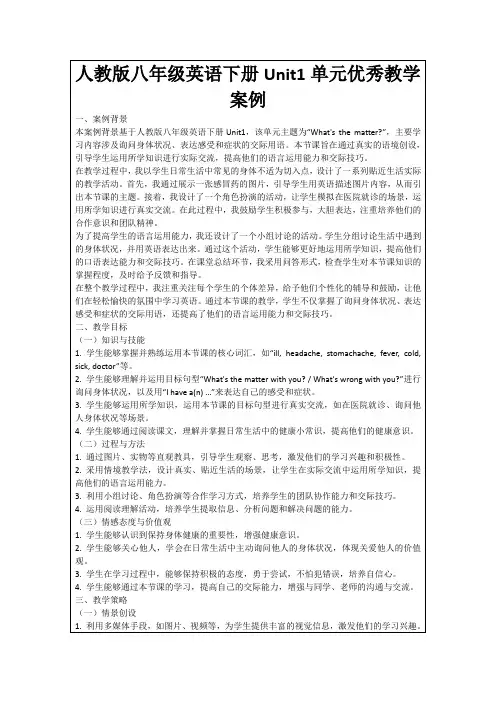
Unit 1 What’s the matter?教学目标:1语言目标:描述健康问题的词汇,及如何根据别人的健康问题提建议。
2 技能目标:能听懂谈论健康问题的对话材料;能根据别人的健康问题提建议;能写出重点单词和重点句型,并能描述怎样对待健康问题。
3 情感目标:通过开展扮演病人等活动,培养学生关心他人身体健康的品质。
通过本课的阅读,培养学生处理紧急事件的基本能力,树立紧急事件时互相帮助的精神。
教学重点:短语: have a stomachache, have a c old, lie down, take one’s temperature, go to a doctor, get off, to one’s surprise, agree to do sth., get into trouble,fall down, be used to, run out (of), cut off , get out of, be in control of ,keep on (doing sth.), give up句子:1 What’s th e matter? I have a stomachache. You shouldn’t eat so much next time.2 What’s the matter with Ben?He hurt himself. He has a sore back.He should lie down and rest.3 Do you have a fever? Yes, I do. No, I don’t. I don’t know.4 Does he have a toothache? Yes, he does.He should see a dentist and get an X-ray.5 What should she do? She should take her temperature.6 Should I put some medicine on it? Yes, you should No, you shouldn’t.教学难点:掌握情态动词should \shouldn’t. 的用法学习have的用法课时划分:Section A1 1a – 2d Section A2 3a-3c Section A3 Grammar Focus-4c Section B1 1a-2e Section B2 3a-Self checkSection A 1 (1a – 2d)Step 1 Warming up and new words1.Look at a picture and learn the parts of the body.2.New words and phrases.Step 2 Presentation1a Look at the picture. Write the correct letter [a-m] for each part of the body.___arm ___ back ___ ear ___ eye ___ foot___hand ___ head ___ leg ___ mouth___ neck ___nose ___ stomach ___ toothStep 3 Listening1b Listen and look at the picture. Then number the names 1-5Listen to the conversations again and fill in the blanks.Conversation 1Nurse: What’s the matter, Sarah?Girl: I ___________.Conversation 2Nurse: What’s the matter, David?Boy: I _________________.Conversation 3Nurse: What’s the matter, Ben?Boy: I _________________.Conversation 4Nur se: What’s the matter, Nancy?Girl: I _________________.Conversation 5Betty: What’s the matter, Judy?Ann: She __________________.Step 4 Speaking1c Look at the pictures. What are the students’ problems? Make conversations.ExamplesA: What’s the matter with Judy?B: She talked too much yesterday and didn’t drink enough water.She has a very sore throat now.A: What’s the matter with Sarah?B: She didn’t take care of herself on the weekend. She was playing withher friends a t the park yesterday. Then it got windy, but she didn’t puton her jacket. Now she has a cold.Step 5 Guessing gamesGuess what has happened to the students by using the important sentences.Step 6 Listening2a Listen and number the pictures [1-5] in the order you hear them.2b Listen again. Match the problems with the advice.Step 7 Speaking2c Make conversations using the information in 2a and 2bA: What’s the matter?B: My head feels very hot.A: Maybe you have a fever.B: What should I do?A: You should take your temperature.Step 8 Role–playImagine you are the school doctor. A few students have health problems.Role-play a conversation between the doctor and the students.2d Role –play the conversationStep 9 Language points and summary1. What’s the matter?这是人们特别是医生和护士询问病人病情时最常用的问句, 意思是“怎么了?”其后通常与介词with连用。
《What’s the matter?》教学设计
Section A 1 (1a – 2c)
一、教学目标
知识与能力:学习掌握有关身体的词汇以及有关疾病的词汇,并学会描述身体的不适和提出建议。
听懂本课学习活动中的问题及回答,能在本课的任务型活动中进行简单的交流,能正确朗读本的对和句型,能写出本课的单词和句型。
过程与方法:作为教学的引导者,我遵循新课程“学生是学习的主人,一切的教学活动设计以学生为本”的教学理念,坚持“为学生的发展,必须培养学生的自主性、能动性、独立性和创造性”的教学原则。
课堂教学中利用图片,单词卡片等直观的教学手段,通过任务型教学法,游戏教学法,情景教学法等教学法引导学生学习,使枯燥的单词教学变得生动有趣,激活课堂,最终达到预期的教学目标。
情感态度与价值观:通过描述自己的身体的不适提出建议,表达自己的看法,使学生在人际交往中学会关心别人,增进情谊。
用恰当的方式表达自己的看法,增进人际交往中学会关心别人的能力,了解英美国家询问和表达身体不适的习惯,培养世界意识。
二、教材分析及教学重难点
教材分析:本节课的主要内容是新目标英语八年级上册第2单元第一课时,教材是以What’s the matter ?为中心话题,描述身体不适和提出建议展开,学习和运用What’s the matter 和“What should …do?”让学生学会描述身体的不适和提出建议,本课教材内容与学生的实际生活密切相关,易于引出学生运用简单的英语进行交际和交流,在学习活动中,学生通过交换对身体不适的描述及建议,促进学生之间和师生之间的情感交流,增进情谊。
学情分析:八年级学生有了一定的语言基础,再加上本课内容为询问人的身体健康方面的问题,与学生的生活密切相关,更容易激发同学们的学习兴趣和参与度。
教学重点:本节课主要学习身体部位的单词和一些疾病的词汇,以及身体不适的表达及建议。
第一课时主要学习的内容是学习有关身体部位的单词,学习“What’s the matter ?”和“What should …do?”句型。
教学难点:身体不适的表达及建议,掌握情态动词should \shouldn’t. 的用法,学习have的用法
三、教学策略
语音教学让学生进行模仿操练;词汇教学──采取情景介绍或演示对比的方式进行教学,让学生在情境中操练、理解含义,并学会运用;口语教学采取pair work 问答式的口语交际活动或游戏等小组活动互相操练;听力教学采取图文配对和对话选择的方式;写作教学以填词、回答问题、写简单的短文为主;语法教学——总结规律、抓住特征、模仿操练。
四、教学过程
教学反思
本节课是一节阅读课,新单词、新短语和新句型不少,从而给学生的阅读和理解带来了一定的困难,而要培养学生的综合素质,就要从听、说、读、写等方面进行着手并给出相应的练习。
虽然这节课基本上完成了教学任务,但和理想中的完美优质课相比还是有一定的差距,具体表现有几下方面:
1. 教学活动的时间安排不够合理。
例如单词和短语的教读占用了过多的时间,导致后面的pairwork的练习不充分,没有充分的体现“学生的主体性”这一理念。
2. 害怕学生听不懂,所以课堂英语用语的重复频率有点高。
3. 课堂的气氛没有充分的调动起来。
虽然这节课有让学生进行听力训练,课文朗读以及口语练习,但是学生的积极性以及配合的程度还没有达到预想的状态。
4. 鼓励性语言少而单一。
在学生个人回答以及集体回答问题时,我的回答总是“good”,“great”等,少而单一。